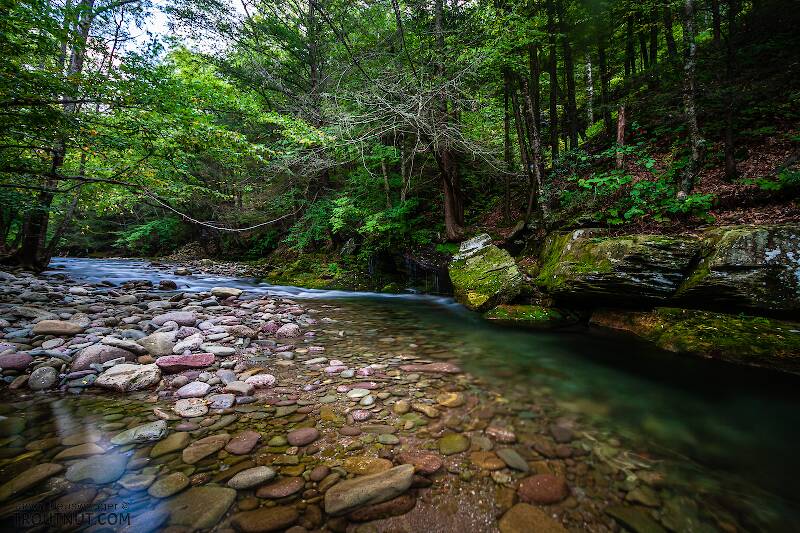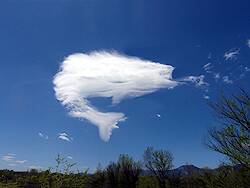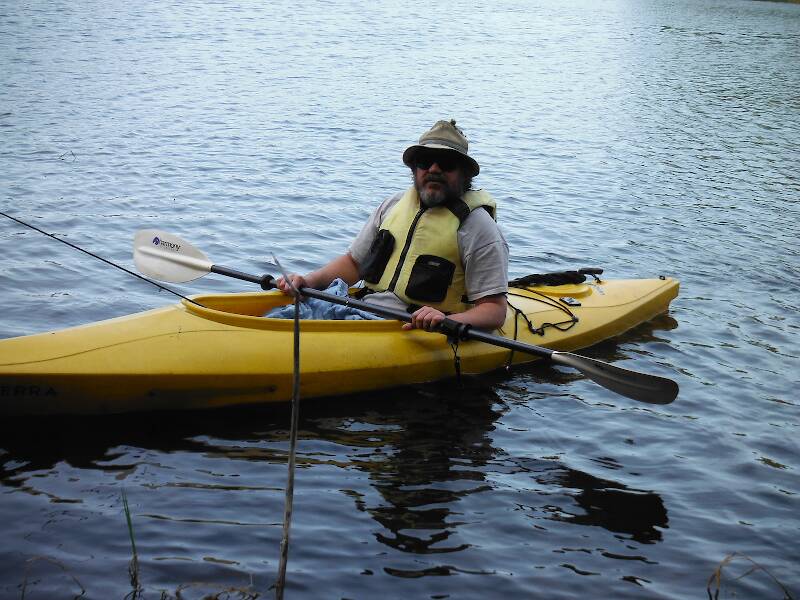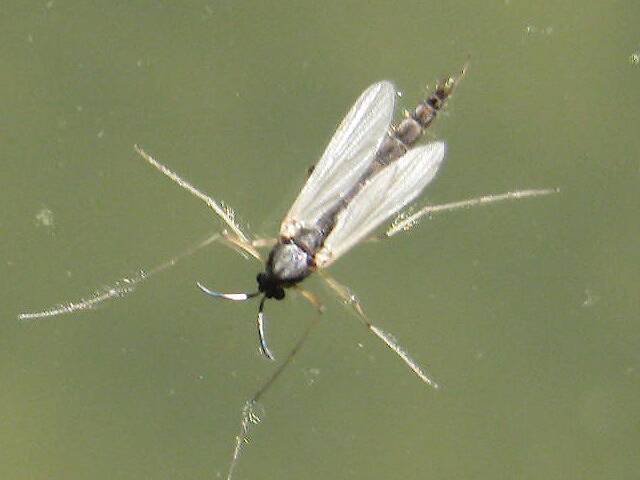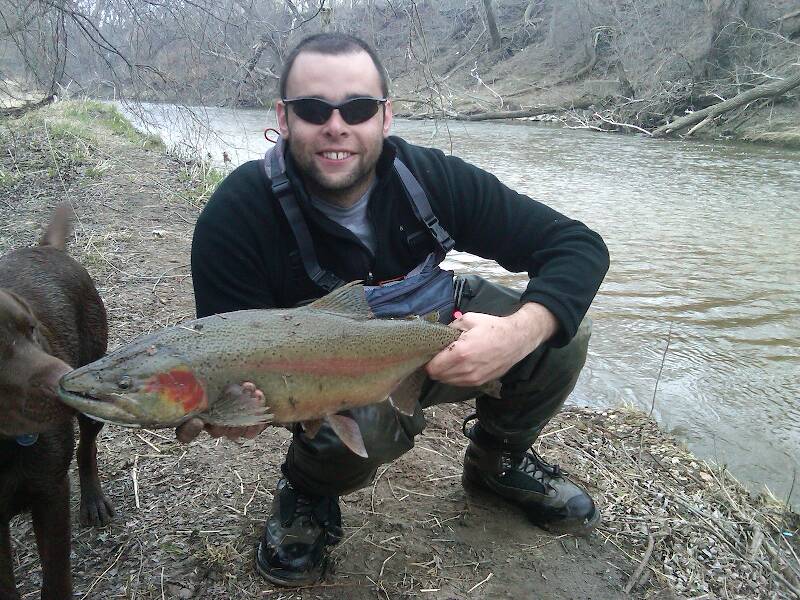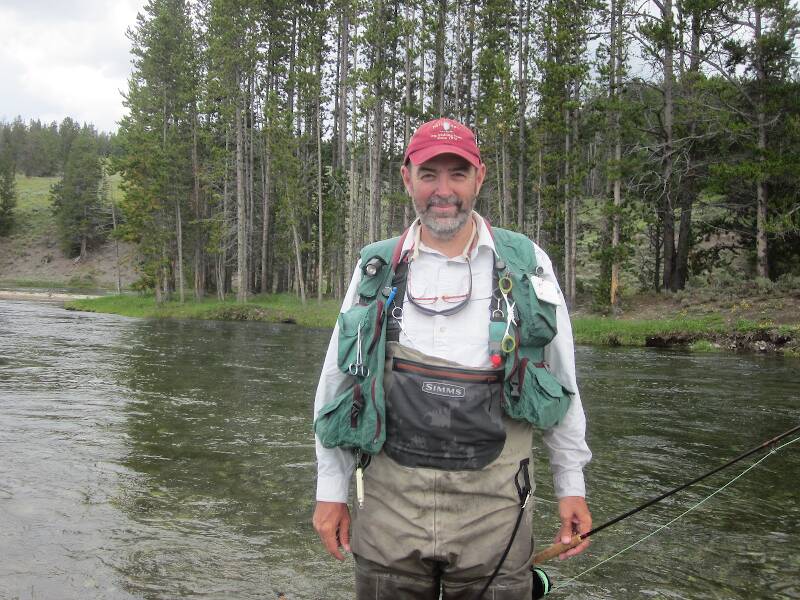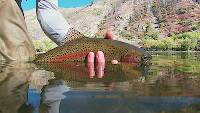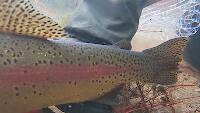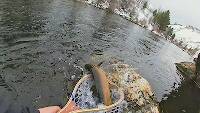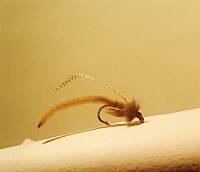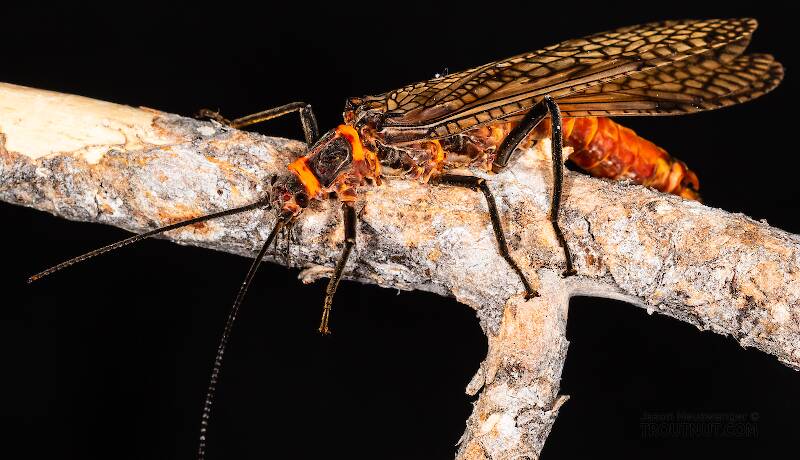
Salmonflies
Pteronarcys californica
The giant Salmonflies of the Western mountains are legendary for their proclivity to elicit consistent dry-fly action and ferocious strikes.
Featured on the forum

This species was fairly abundant in a February sample of the upper Yakima.

Troutnut is a project started in 2003 by salmonid ecologist Jason "Troutnut" Neuswanger to help anglers and
fly tyers unabashedly embrace the entomological side of the sport. Learn more about Troutnut or
support the project for an enhanced experience here.
PaulRoberts on Mar 3, 2014March 3rd, 2014, 4:26 pm EST
Louis-
Are trout under pressure not somewhat generally harder to catch than those that have never seen a fly? That is, if we do not spook them first? Doesn't some learning take place in some fish?
That was certainly a skillfully presented offering. Just for the sake of stirring the pot, please allow me to present an alternate theory. Not unlike flyfishers, some trout are more cautious than others. So in pressured waters, those with a lower CQ don't last long :-)
That didn’t slip by me, I was actually going to let it pass out of sheer laziness. But since you didn’t, Roger, I’ll bite.
The danger, and one mentioned in the article above, is that of anthropocentrism.
The evidence behind fish learning-to-avoid-angling comes in two forms:
-Population wide: Future generations get harder to catch bc the vulnerable fish were removed. This is not the question at hand, but often gets muddled in when talking catchability of fish in a given water.
-Individual fish: The ability to "learn", to adjust ones behavior, is not the same as being able to reason, to consider the future in a self perceptive way (or to suffer emotionally) in the same way we do.
But … so what? If fish are able to protect their bodily interests, shouldn’t we respect that? One way is to ascertain the physical stress and emotional suffering that might result from being captured. This is what’s at issue in Germany. Consensus in the above article suggests that the latter is not a valid concern in light of what’s known about fish nervous systems. The former can run the gamut from a fish dying from capture/handling damage to being released to take another lure ten minutes later. Conducted thoughtfully, the act of C&R creates a short term stress response from fish -little more. We each have a hand in the outcomes and most anglers, fly fishers esp, take care in this regard.
Regardless, in the end, I reject the assumptions of the German lawmakers as anti-ecological, ignoring the way nature works in a ham-fisted attempt to raise us all "above" … what?? Nature itself?!
But our self-indulgent empathetic judgments and penchant for monkeying with just about anything are bound to weigh in as we further domesticate the world, making it more and more “comfortable” for ourselves. Maybe then we will have succeeded in “evolving” to our “highest selves”, as the equal-rights-for-animals people have put it. Two BIG problems I see:
-Our highest cultural selves may not be what’s best for the ecological planet that grew us in the first place.
-Unbeknownst to nearly all, and underappreciated by most of the rest, is that evolution operates laterally, not vertically/hierarchically. Likely, continuing out on such a limb will leave our "higher selves" impoverished. Again, what's construed as a higher plane for us may not pan out so well for what's supporting us from "beneath".
Jmd123 on Mar 3, 2014March 3rd, 2014, 5:41 pm EST
Paul, wonderfully insightful post, and another very interesting article (if shorter than the first).
A personal experience:
Some years ago I lived in Ann Arbor, Michigan and fished the Huron River (some will recall my posts from then). One day while tossing flies into a favorite smallmouth spot a school of good-sized carp moved in. When they wouldn't chase the fly I was throwing - a #10 chartreuse KBF - I let it sink to the bottom. A big carp swam over it and sucked it in. I slammed the hook into him so hard I found later that he was actually bleeding, yet he hardly reacted other than with a little flinch...and then proceeded to fight like a wet sock, I lead him around by the nose with a 7-foot 3-weight that he could have broken, but he or she didn't even try to fight. This fish weighed TEN POUNDS and measured 28 inches long and is still the largest fish I have ever caught on a fly rod - and it didn't put up squat for a fight, no panic, no reel-burning runs, nice healthy looking fish with golden sides and bright red fins...can't say I'm enthusiastic about carp fishing on a fly rod. But if I made this fish bleed, it sure didn't seem to bother it all that much other than it couldn't go where it wanted to and I was pulling on it. Some fellows who actually targeted the carp there - and apparently got some much better fights out of them - told me that certain fish might be very sluggish post-spawn. Still, put a bleeding would into the mouth of any mammal and they are going to run away, in pain.
Jonathon
A personal experience:
Some years ago I lived in Ann Arbor, Michigan and fished the Huron River (some will recall my posts from then). One day while tossing flies into a favorite smallmouth spot a school of good-sized carp moved in. When they wouldn't chase the fly I was throwing - a #10 chartreuse KBF - I let it sink to the bottom. A big carp swam over it and sucked it in. I slammed the hook into him so hard I found later that he was actually bleeding, yet he hardly reacted other than with a little flinch...and then proceeded to fight like a wet sock, I lead him around by the nose with a 7-foot 3-weight that he could have broken, but he or she didn't even try to fight. This fish weighed TEN POUNDS and measured 28 inches long and is still the largest fish I have ever caught on a fly rod - and it didn't put up squat for a fight, no panic, no reel-burning runs, nice healthy looking fish with golden sides and bright red fins...can't say I'm enthusiastic about carp fishing on a fly rod. But if I made this fish bleed, it sure didn't seem to bother it all that much other than it couldn't go where it wanted to and I was pulling on it. Some fellows who actually targeted the carp there - and apparently got some much better fights out of them - told me that certain fish might be very sluggish post-spawn. Still, put a bleeding would into the mouth of any mammal and they are going to run away, in pain.
Jonathon
No matter how big the one you just caught is, there's always a bigger one out there somewhere...
Feathers5
Posts: 287
Posts: 287
Feathers5 on Mar 4, 2014March 4th, 2014, 4:13 am EST
Arrogant!
How's that for a non-sequitur.
How's that for a non-sequitur.
Falsifly on Mar 4, 2014March 4th, 2014, 7:44 am EST
He spotted; no it was more of a sounding that first caught his distain, that damn kurplunk and the clicking of the bail. As he turned to have a look his irk hit a new mercurial high, the SOB had a fish on. He watched through the corner of his eye not wanting to give the spin caster more reason to gloat of his success by acknowledgment. The proceedings followed his expectations, out came the net, then the unhooking of the grappling treble hook, and the final insult as the fish was jammed into the canvas creel. He couldn’t help but notice the shabby attire but with the cheep rubber hip boots and the haphazardly applied inner tube patches of both square and round that stood out like red scabs. Every time he ventured out of his protected C&R refuge he had to put up with this crap. Even there his serenity was constantly defiled by the endless onslaught of canoes and tubes. And with each passing day it seemed too get even worse.
He was working upstream and the spin caster was working down. He briefly considered quitting right there and heading back to his C&R sanctuary to avoid the closeness of having to pass this unwanted incursion into what should be his domain. How, he wondered, could anyone kill a trout, let alone consider it sporting with a spinner bait. He grasped for the moral high ground claiming his conservatism and the protection of the trout to further his sporting pleasure well into the future. How, he wondered, could anyone see it differently?
When he first caught the glint of the sweeping rod he felt it strange that a fly caster would venture this deep into his territory. He felt he had given up enough of his water to the C&R wackos. This intrusion was further proof that they wouldn’t be happy until they took it all. His thoughts were disrupted when he saw the deep bend in the rod and the battle begin. The proceedings followed his expectations, a long drawn out fight until the fish succumbed to exhaustion, then into the net, the hook released, and the fish returned to the water. He thought to himself, probably another fish that will succumb to the stress and die, what a waste. He couldn’t help but notice the glaring opulence that these types adorned. An in your face elitism that exuded arrogance and snobbery. Why, he wondered, don’t they stick to their own water? With each passing day he felt his legal take would vanish into oblivion.
He was fishing downstream and the fly caster was fishing up. He briefly considered quitting right there, only one fish short of his limit, to avoid the closeness of having to pass this unwanted incursion into what should be his domain. How, he wondered, could anyone restrict his right to take a fish by claiming C&R only? He grasped for the moral high ground claiming the wasting of a resource to the wanton sport of C&R only. How, he wondered, could anyone see it differently?
And the trout were oblivious to all but for the struggle to survive.
He was working upstream and the spin caster was working down. He briefly considered quitting right there and heading back to his C&R sanctuary to avoid the closeness of having to pass this unwanted incursion into what should be his domain. How, he wondered, could anyone kill a trout, let alone consider it sporting with a spinner bait. He grasped for the moral high ground claiming his conservatism and the protection of the trout to further his sporting pleasure well into the future. How, he wondered, could anyone see it differently?
When he first caught the glint of the sweeping rod he felt it strange that a fly caster would venture this deep into his territory. He felt he had given up enough of his water to the C&R wackos. This intrusion was further proof that they wouldn’t be happy until they took it all. His thoughts were disrupted when he saw the deep bend in the rod and the battle begin. The proceedings followed his expectations, a long drawn out fight until the fish succumbed to exhaustion, then into the net, the hook released, and the fish returned to the water. He thought to himself, probably another fish that will succumb to the stress and die, what a waste. He couldn’t help but notice the glaring opulence that these types adorned. An in your face elitism that exuded arrogance and snobbery. Why, he wondered, don’t they stick to their own water? With each passing day he felt his legal take would vanish into oblivion.
He was fishing downstream and the fly caster was fishing up. He briefly considered quitting right there, only one fish short of his limit, to avoid the closeness of having to pass this unwanted incursion into what should be his domain. How, he wondered, could anyone restrict his right to take a fish by claiming C&R only? He grasped for the moral high ground claiming the wasting of a resource to the wanton sport of C&R only. How, he wondered, could anyone see it differently?
And the trout were oblivious to all but for the struggle to survive.
Falsifly
When asked what I just caught that monster on I showed him. He put on his magnifiers and said, "I can't believe they can see that."
When asked what I just caught that monster on I showed him. He put on his magnifiers and said, "I can't believe they can see that."
Kschaefer3 on Mar 4, 2014March 4th, 2014, 8:22 am EST
Thank you, Falsifly! That is perfect.
Oldredbarn on Mar 4, 2014March 4th, 2014, 9:59 am EST
Allan,
I like your James Joyce approach here. In his "Ulysses" he used this same literary device...It is one full day in Dublin and my version runs to 768 pages! One character tells us his part of the story and later we hear from other characters their side. One guy sees someone he knows across the street and ducks into a store to avoid him...Later the other character watches as his "friend" ducks in to the store, not knowing he's being avoided.
It is a matter of perspective. Each of us holding our own in the highest regard.
Spence
I like your James Joyce approach here. In his "Ulysses" he used this same literary device...It is one full day in Dublin and my version runs to 768 pages! One character tells us his part of the story and later we hear from other characters their side. One guy sees someone he knows across the street and ducks into a store to avoid him...Later the other character watches as his "friend" ducks in to the store, not knowing he's being avoided.
It is a matter of perspective. Each of us holding our own in the highest regard.
Spence
"Even when my best efforts fail it's a satisfying challenge, and that, after all, is the essence of fly fishing." -Chauncy Lively
"Envy not the man who lives beside the river, but the man the river flows through." Joseph T Heywood
"Envy not the man who lives beside the river, but the man the river flows through." Joseph T Heywood
Jmd123 on Mar 4, 2014March 4th, 2014, 10:30 am EST
Very nicely put there, Allan. To each their own...
Jonathon
Jonathon
No matter how big the one you just caught is, there's always a bigger one out there somewhere...
PaulRoberts on Mar 4, 2014March 4th, 2014, 8:36 pm EST
http://news.stanford.edu/news/2007/march7/sapolskysr-030707.html
Robert Sapolsky discusses physiological effects of stress
'We’ve evolved to be smart enough to make ourselves sick'
Stanford Report, March 7, 2007
…
All vertebrates respond to stressful situations by releasing hormones, such as adrenalin and glucocorticoids, which instantaneously increase the animal's heart rate and energy level. "The stress response is incredibly ancient evolutionarily," Sapolsky said. "Fish, birds and reptiles secrete the same stress hormones we do, yet their metabolism doesn't get messed up the way it does in people and other primates."
To understand why, he said, "just look at the dichotomy between what your body does during real stress—for example, something is intent on eating you and you're running for your life—versus what your body does when you're turning on the same stress response for months on end for purely psychosocial reasons."
In the short term, he explained, stress hormones are "brilliantly adapted" to help you survive an unexpected threat. "You mobilize energy in your thigh muscles, you increase your blood pressure and you turn off everything that's not essential to surviving, such as digestion, growth and reproduction," he said. "You think more clearly, and certain aspects of learning and memory are enhanced. All of that is spectacularly adapted if you're dealing with an acute physical stressor—a real one."
But non-life-threatening stressors, such as constantly worrying about money or pleasing your boss, also trigger the release of adrenalin and other stress hormones, which, over time, can have devastating consequences to your health, he said: "If you turn on the stress response chronically for purely psychological reasons, you increase your risk of adult onset diabetes and high blood pressure. If you're chronically shutting down the digestive system, there's a bunch of gastrointestinal disorders you're more at risk for as well."
…
Robert Sapolsky discusses physiological effects of stress
'We’ve evolved to be smart enough to make ourselves sick'
Stanford Report, March 7, 2007
…
All vertebrates respond to stressful situations by releasing hormones, such as adrenalin and glucocorticoids, which instantaneously increase the animal's heart rate and energy level. "The stress response is incredibly ancient evolutionarily," Sapolsky said. "Fish, birds and reptiles secrete the same stress hormones we do, yet their metabolism doesn't get messed up the way it does in people and other primates."
To understand why, he said, "just look at the dichotomy between what your body does during real stress—for example, something is intent on eating you and you're running for your life—versus what your body does when you're turning on the same stress response for months on end for purely psychosocial reasons."
In the short term, he explained, stress hormones are "brilliantly adapted" to help you survive an unexpected threat. "You mobilize energy in your thigh muscles, you increase your blood pressure and you turn off everything that's not essential to surviving, such as digestion, growth and reproduction," he said. "You think more clearly, and certain aspects of learning and memory are enhanced. All of that is spectacularly adapted if you're dealing with an acute physical stressor—a real one."
But non-life-threatening stressors, such as constantly worrying about money or pleasing your boss, also trigger the release of adrenalin and other stress hormones, which, over time, can have devastating consequences to your health, he said: "If you turn on the stress response chronically for purely psychological reasons, you increase your risk of adult onset diabetes and high blood pressure. If you're chronically shutting down the digestive system, there's a bunch of gastrointestinal disorders you're more at risk for as well."
…
Jmd123 on Mar 5, 2014March 5th, 2014, 7:59 am EST
So in essence, we are both blessed and cursed by our big brains. We are blessed with abilities in logic, problem solving, engineering, etc. that other animals are incapable of doing. Yet, we are cursed by emotional stresses that other animals do not have to worry about either...as in, when we lose a big fish and spend countless hours reliving the situation trying to figure out what went wrong...
Jonathon
Jonathon
No matter how big the one you just caught is, there's always a bigger one out there somewhere...
PaulRoberts on Mar 9, 2014March 9th, 2014, 6:25 pm EDT
It doesn’t appear to me that “torture” is a relevant term when talking about C&R fishing when practiced with care. I also can't blame humans for being anthropocentric. I'd just like to think that those in positions to make policy can educate themselves beyond unfounded intuitions.
Oldredbarn on Mar 10, 2014March 10th, 2014, 1:24 pm EDT
I'd just like to think that those in positions to make policy can educate themselves beyond unfounded intuitions.
Paul...I love your optimism. You and I know, though, that with the chasm between can & will being what it is, you and I might as well be shouting to them from opposite sides of the Grand Canyon.
Thanks for the links to the science.
BTW...It is now north of 50 here in Detroit today for the first time probably since October! The only thing on my mind though, is how far behind I am with my tying...There's that damn "can and will" thing again!!!
Spence
"Even when my best efforts fail it's a satisfying challenge, and that, after all, is the essence of fly fishing." -Chauncy Lively
"Envy not the man who lives beside the river, but the man the river flows through." Joseph T Heywood
"Envy not the man who lives beside the river, but the man the river flows through." Joseph T Heywood
Overmywader
Posts: 31
Posts: 31
Overmywader on Mar 11, 2014March 11th, 2014, 5:29 pm EDT
A good read on the subject of catch and release is the final chapter of A.A. Luce's book "Fishing and Thinking". The chapter is entitled "the ethics of angling." This was written in 1959. I think anyone reading it would find something to remember.
Another older work, 1938, on the subject is by Howard T. Walden, 2cd (a superb fishing writer). See http://overmywaders.com/index.php?sportsmanship
For how catch and release became so popular, I wrote a few paragraphs on its origins at http://overmywaders.com/index.php?origins
Another older work, 1938, on the subject is by Howard T. Walden, 2cd (a superb fishing writer). See http://overmywaders.com/index.php?sportsmanship
For how catch and release became so popular, I wrote a few paragraphs on its origins at http://overmywaders.com/index.php?origins
Oldredbarn on Mar 13, 2014March 13th, 2014, 8:17 am EDT
http://m.youtube.com/watch?v=TwK0gYTzRz4
I hope this works. Watching Macks Brook Trout Vid I found this old one with Lee Wulff and Curt Gowdy...This is for the older guys here. ;)
Spence
I hope this works. Watching Macks Brook Trout Vid I found this old one with Lee Wulff and Curt Gowdy...This is for the older guys here. ;)
Spence
"Even when my best efforts fail it's a satisfying challenge, and that, after all, is the essence of fly fishing." -Chauncy Lively
"Envy not the man who lives beside the river, but the man the river flows through." Joseph T Heywood
"Envy not the man who lives beside the river, but the man the river flows through." Joseph T Heywood
PaulRoberts on Mar 28, 2014March 28th, 2014, 12:02 am EDT
Interesting, Paul. Besides emotional responses, there's also pain reception as an issue. My understanding is that they don't have a brain that can register pain. ...
Pain is likely to be very different in intensity and range of function between fish and humans. Some more more interesting research:
http://www.theatlantic.com/health/archive/2013/10/social-connection-makes-a-better-brain/280934/
…
The most interesting part of the study is how their brains processed the social rejection. To the brain, social pain feels a lot like physical pain—a broken heart can feel like a broken leg, as Lieberman puts it in his book. The more rejected the participant said he or she felt, the more activity there was in the part of the brain that processes the distress of physical pain.
In a follow-up study, participants were called into the lab and, like last time, played Cyberball in the brain scanner. But this time, there was a twist. Before they came into the lab, half of them had taken Tylenol every day for three weeks while the other half had taken a placebo. What the researchers found in this study was remarkable: the placebo group felt just as rejected and pained as those in the initial study, but the people in the Tylenol group were totally immune to the social pain of feeling left out.
…
Quick Reply
Related Discussions
Topic
Replies
Last Reply
Re: Fish that have been caught before may be more likely to be caught again
In General Discussion by Troutnut
In General Discussion by Troutnut
9
Sep 15, 2010
by GONZO
by GONZO
3
Apr 29, 2009
by Trtklr
by Trtklr

